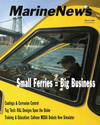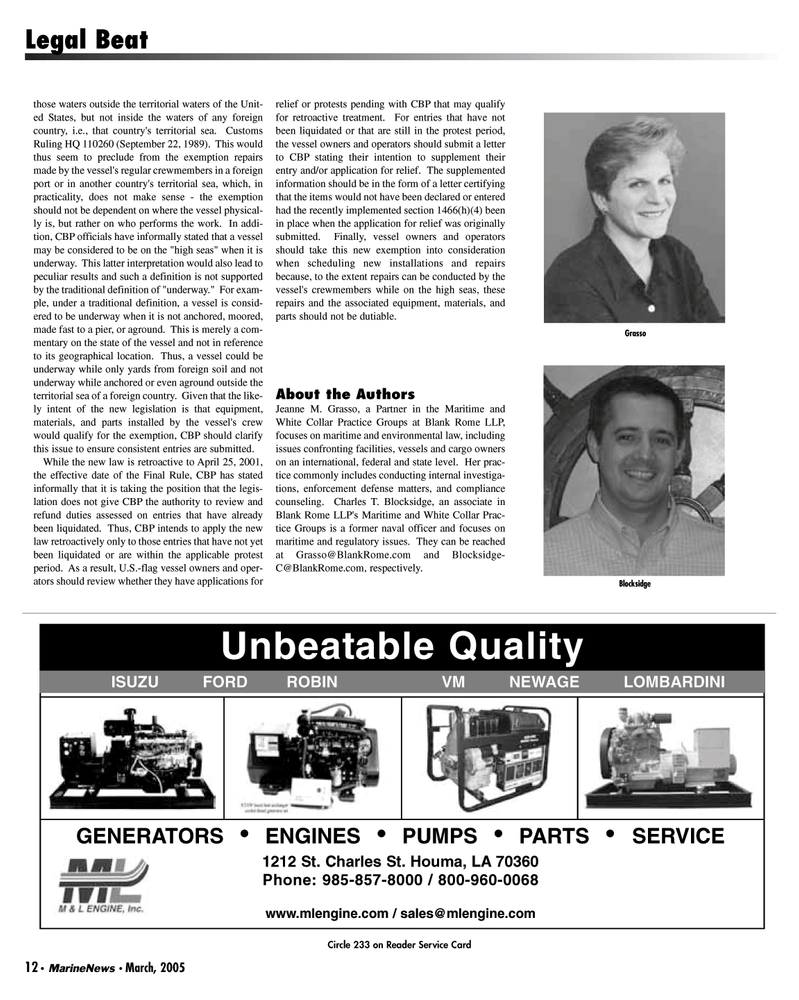
Page 12: of Marine News Magazine (March 2005)
Read this page in Pdf, Flash or Html5 edition of March 2005 Marine News Magazine
12 • MarineNews • March, 2005
Legal Beat those waters outside the territorial waters of the Unit- ed States, but not inside the waters of any foreign country, i.e., that country's territorial sea. Customs
Ruling HQ 110260 (September 22, 1989). This would thus seem to preclude from the exemption repairs made by the vessel's regular crewmembers in a foreign port or in another country's territorial sea, which, in practicality, does not make sense - the exemption should not be dependent on where the vessel physical- ly is, but rather on who performs the work. In addi- tion, CBP officials have informally stated that a vessel may be considered to be on the "high seas" when it is underway. This latter interpretation would also lead to peculiar results and such a definition is not supported by the traditional definition of "underway." For exam- ple, under a traditional definition, a vessel is consid- ered to be underway when it is not anchored, moored, made fast to a pier, or aground. This is merely a com- mentary on the state of the vessel and not in reference to its geographical location. Thus, a vessel could be underway while only yards from foreign soil and not underway while anchored or even aground outside the territorial sea of a foreign country. Given that the like- ly intent of the new legislation is that equipment, materials, and parts installed by the vessel's crew would qualify for the exemption, CBP should clarify this issue to ensure consistent entries are submitted.
While the new law is retroactive to April 25, 2001, the effective date of the Final Rule, CBP has stated informally that it is taking the position that the legis- lation does not give CBP the authority to review and refund duties assessed on entries that have already been liquidated. Thus, CBP intends to apply the new law retroactively only to those entries that have not yet been liquidated or are within the applicable protest period. As a result, U.S.-flag vessel owners and oper- ators should review whether they have applications for relief or protests pending with CBP that may qualify for retroactive treatment. For entries that have not been liquidated or that are still in the protest period, the vessel owners and operators should submit a letter to CBP stating their intention to supplement their entry and/or application for relief. The supplemented information should be in the form of a letter certifying that the items would not have been declared or entered had the recently implemented section 1466(h)(4) been in place when the application for relief was originally submitted. Finally, vessel owners and operators should take this new exemption into consideration when scheduling new installations and repairs because, to the extent repairs can be conducted by the vessel's crewmembers while on the high seas, these repairs and the associated equipment, materials, and parts should not be dutiable.
About the Authors
Jeanne M. Grasso, a Partner in the Maritime and
White Collar Practice Groups at Blank Rome LLP, focuses on maritime and environmental law, including issues confronting facilities, vessels and cargo owners on an international, federal and state level. Her prac- tice commonly includes conducting internal investiga- tions, enforcement defense matters, and compliance counseling. Charles T. Blocksidge, an associate in
Blank Rome LLP's Maritime and White Collar Prac- tice Groups is a former naval officer and focuses on maritime and regulatory issues. They can be reached at [email protected] and Blocksidge-
[email protected], respectively.
Circle 233 on Reader Service Card
Unbeatable Quality
ISUZU FORD ROBIN VM NEWAGE LOMBARDINI
GENERATORS • ENGINES PUMPS PARTS SERVICE 1212 St. Charles St. Houma, LA 70360
Phone: 985-857-8000 / 800-960-0068 www.mlengine.com / [email protected]
Grasso
Blocksidge
MN MARCH05 2(9-16).qxd 3/4/2005 12:09 PM Page 12

 11
11

 13
13
